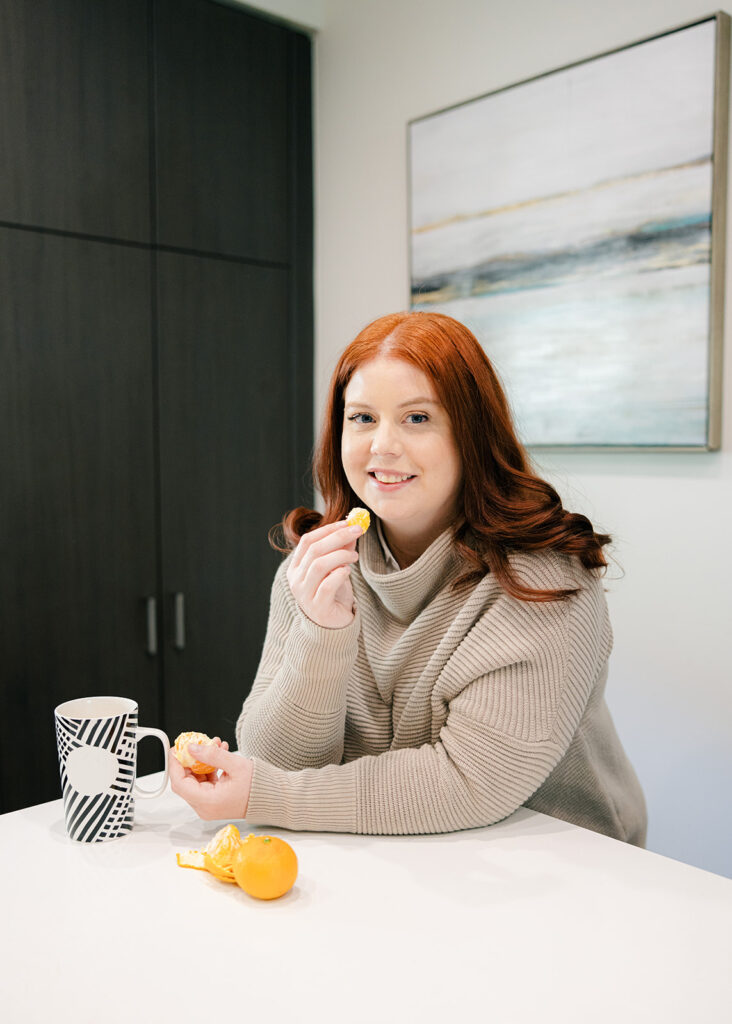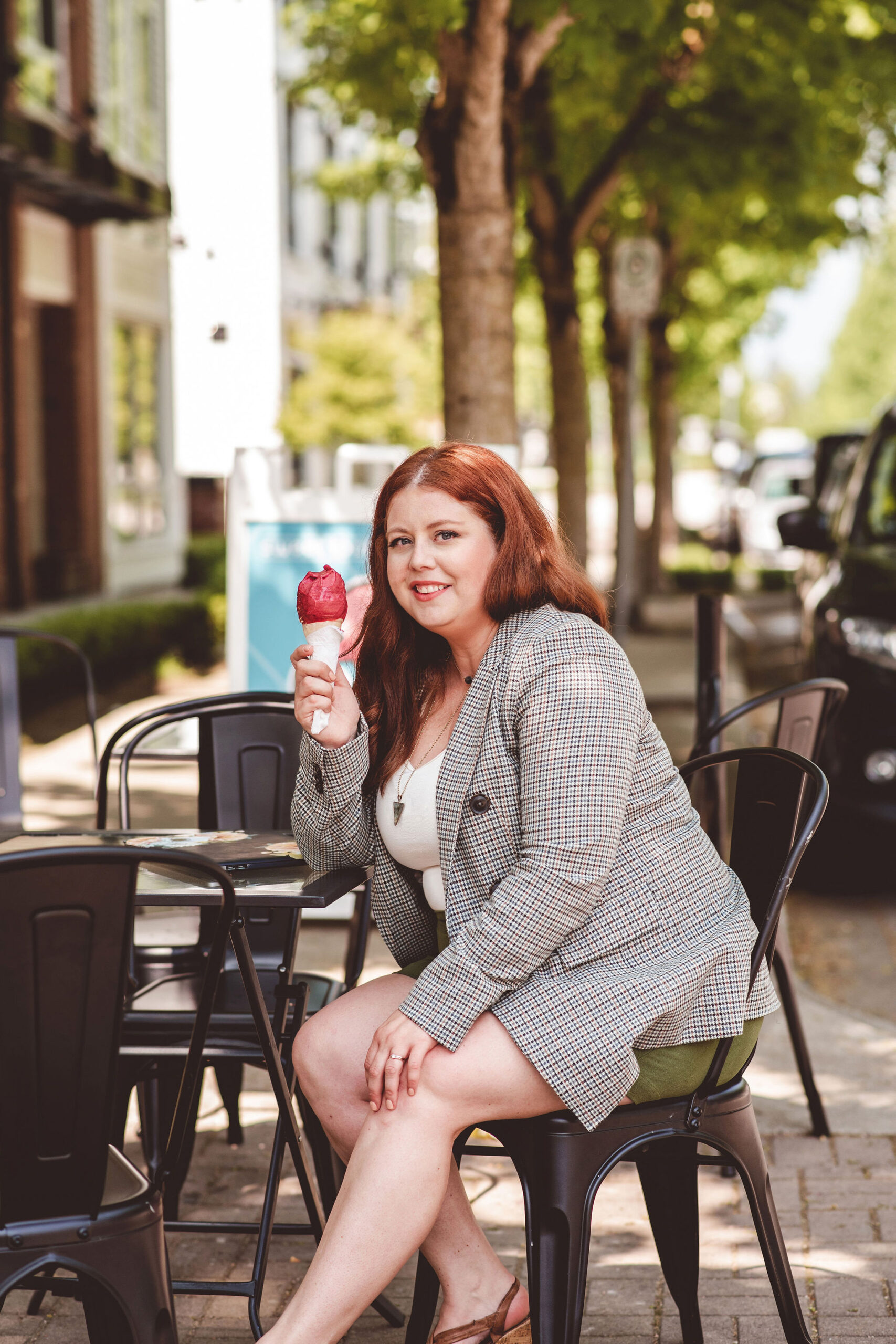You’re smart. You’re capable. And yet, food still feels like the only thing that helps when emotions run high. If you’ve ever thought, “Why can’t I stop eating when I’m not hungry?” or “Why do I turn to food every time I feel overwhelmed?”, you’re not alone. In this post, we’ll explore how to stop using food as a coping mechanism in a way that doesn’t rely on willpower or shame, but instead builds real emotional safety, self-trust, and care.
Hi, I’m Dr. Meredith MacKenzie, a binge eating therapist and intuitive eating coach. If you’re ready to shift survival patterns and build a more peaceful relationship with food, my group program, One Body To Love, offers the tools, support, and community to help you get there. You can also work with me one-on-one for deeper healing. And for daily support, tools, and real talk, you’ll find a safe space on Instagram.

What Are Survival Patterns?
When life feels overwhelming, your body and brain naturally try to protect you. These protective habits, often called survival patterns, kick in when something feels off or unsafe, even if there’s no clear danger.
For a lot of people, food becomes part of that pattern. It brings comfort, offers a break from stress, or creates a sense of control when everything else feels uncertain. If you’ve turned to food during tough moments, it doesn’t mean you’ve failed. It means your body found a way to help you feel okay.
However, over time, that pattern can start to make you feel stuck. You might find yourself eating without knowing why, or wondering how to stop using food as a coping mechanism when emotions run high. The first step is simply noticing that this is a survival response, not a flaw. Just a sign that something inside is asking for care.
If you feel trapped in the same eating patterns over and over, this video is for you. I break down the cycle, and how to finally shift it.
How Dieting Triggers Survival Mode
Dieting often triggers the very patterns you want to escape. When you restrict food, your body senses danger, not a diet. Hunger feels like a threat, and your brain shifts into survival mode.
In that state, stress rises, cravings intensify, and food becomes harder to manage. This isn’t a willpower issue. It’s your body doing what it’s meant to do: protect you.
Most people end up eating more, not less. That’s not failure, it’s a natural response. Dieting makes it harder to stop using food as a coping mechanism because it reinforces the very survival patterns you’re trying to heal. The answer isn’t more control. It’s creating safety, so your body no longer feels like being threatened.
Speaking of dieting… in my latest blog, I break down whether the Mediterranean Diet can actually help you stop binge eating (or if it’s just another form of control in disguise). Take a look here.
And, if you’ve ever felt like dieting rewired your relationship with food, this video will help connect the dots.
Understanding the Role of Food in Emotional Regulation
When life feels heavy or uncertain, food can become a way to cope. For many people, eating is not just about hunger. It’s about finding comfort, control, or calm when emotions feel too big.
Here’s how that can look:
- You feel overwhelmed, anxious, sad, or just stretched too thin, and food brings a moment of relief.
- You’re not physically hungry, but eating helps soothe the emotional weight you’re carrying.
- For a few minutes, food quiets the noise in your mind and body. It gives you a break.
- Over time, that quick comfort becomes a habit, especially when you don’t have other ways to feel supported or safe.
- Afterward, the emotions often come back, and sometimes shame or guilt tags along, making it even harder.
- The cycle continues, and you find yourself wondering how to stop using food as a coping mechanism when it’s the only thing that seems to help in the moment.
Turning to food like this isn’t a weakness. It’s a way of coping when you haven’t had enough other options. The goal isn’t to take food away. It’s to understand what it’s doing for you so you can build new ways to care for yourself.
The Role of Early Experiences and Conditioning
From a young age, many of us were taught that food was comfort, love, or reward. Maybe you were praised for cleaning your plate or offered treats when you were upset. Maybe emotions weren’t talked about openly, and food became a quiet way to soothe what couldn’t be said. These early messages shape how we relate to food, often in ways we don’t realize.
If you grew up needing to keep the peace or make others happy, you may have learned to push your own needs aside. People-pleasing and emotional suppression often go hand in hand. When it didn’t feel safe to express how you really felt, food may have been one of the few ways you could care for yourself. Not because you were doing something wrong, but because you were trying to feel okay in the only way you knew how.
Why Willpower Doesn’t Help You Stop Using Food as a Coping Mechanism
You’ve probably heard things like “Just have more self-control” or “Suck it up.” But the truth is, willpower has limits. It can’t undo the deep emotional wiring that’s been built over years of stress, restriction, or unmet needs. Trying to rely on willpower alone is like trying to outrun your own shadow. It just doesn’t work.
Willpower often backfires. It leaves you feeling ashamed or stuck when things don’t go perfectly. It pushes control over care and drains the energy you need to heal.
What if, instead of striving for perfection, you focused on feeling safe? What if you asked, “What do I need right now?” instead of “Why can’t I stop this?” That shift from force to curiosity is where change begins.
How Healing Happens: Safety, Trust, and Compassion
Healing happens when you begin to feel safe with yourself. That kind of safety doesn’t come from food rules, it comes from small, steady moments of care.
- Safety starts with tuning in.
Noticing your hunger. Trusting your cues. Letting yourself eat without guilt. - It also means offering support when you feel stuck.
Even a quiet “I’m here for you” can soften the pressure inside. - Trust builds through small pauses.
Maybe you stop and ask, “What am I feeling? What do I really need right now?” - Compassion keeps you grounded.
When shame shows up, you respond with kindness instead of criticism. - A healthy relationship with food feels peaceful, not perfect.
You eat when you’re hungry, rest when you’re full, and no longer tie your worth to what’s on your plate. Food becomes just food. Neutral and nourishing.
This is how things start to shift. With safety, trust, and compassion, one small moment at a time.
If you turn to food when emotions run high, this video will help you understand why, and how to start finding true food freedom.
Taking Gentle Steps Toward Change
Here are some simple, kind ways to begin shifting away from using food as a coping strategy:
- Name the feeling. When you reach for food, pause and ask yourself what you’re feeling first. Sometimes naming frustration, loneliness, boredom, or disappointment brings relief on its own.
- Ask what you need. Maybe you need a moment of rest, a glass of water, a hug, or to notice your breath. Does dialing a friend help? Do you need to move?
- Create mini gentle rituals. These could be lighting a candle, holding a warm cup of tea, doodling, listening to music, going outside, even just for one minute. Replace urgency with small, soothing acts.
- Practice curiosity. If you eat when lonely or stressed, you might ask: “What was happening just before I reached for food? What was going on inside?”
- Be kind when you slip. Slipping does not mean failure. It means you learned something. What could you learn when it happens next time? What will you try differently?
- Seek support. Healing doesn’t happen in isolation. Having someone like me to walk alongside you. I can help you feel seen, supported, and safe as you build trust and connection with yourself.
What Healing Looks Like When You Stop Using Food as a Coping Mechanism
You’re learning how to stop using food as a coping mechanism, not by force, but by building trust and safety within yourself. This work isn’t about perfection. It’s about meeting yourself with care, asking gentle questions, and taking small, steady steps forward. There’s no one right way to begin, and you don’t have to figure it out by yourself.
One Body To Love, my group coaching program, offers a supportive space to unpack survival patterns, let go of self-blame, and reconnect with your body in a way that feels safe and sustainable.
Prefer to move at your own pace? Food Freedom in a Weekend gives you practical tools to shift out of all-or-nothing eating patterns and find more calm with food.
Looking for deeper support? My 1:1 coaching helps you explore the emotional roots of your eating with compassion and curiosity. If you’re unsure where to start, you can book a free discovery call and we’ll decide together.
And if you’re just getting started, explore my free resources; including the One Body To Love podcast, YouTube channel, and helpful downloads. Wherever you begin, you’re welcome here.
